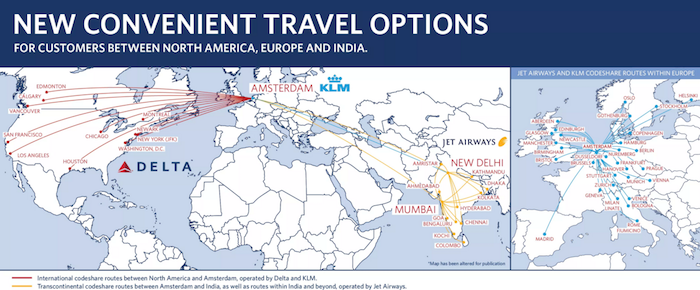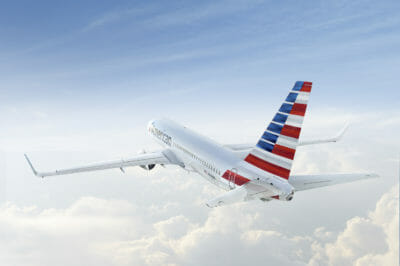Delta Air Lines will be returning to India in 2019 after a four-year hiatus. In 2015, Delta ended commercial service to India, terminating a fifth-freedom route from Amsterdam to Mumbai that it had flown since 2009 following its merger with Northwest Airlines. For a more in-depth analysis of the history of this route, I’ve written extensively about this and other nonstop North America-India routes that have been terminated and reinstated in recent years, so this is a topic that I naturally find of massive interest.
What’s Changed?
The carrier blamed the Middle East carriers, Emirates, Etihad, and Qatar Airways, for its failure to sustain commercially viable service to the subcontinent back in 2015. During that period, all three carriers were expanding aggressively to the U.S., and Delta crusaded a campaign against the Gulf carriers by alleging that they were heavily subsidized by their national governments and flooding markets with excessive seat capacity at unsustainably low fares.
After a multi-year spat with these airlines, the U.S. and the governments of the United Arab Emirates and Qatar have recently agreed to become more transparent about the issue of alleged subsidies, in which the carriers have agreed to make their financial statements public and halt plans to launch fifth-freedom routes to the U.S. Examples of fifth freedom routes include Emirates serving New York JFK-Milan or Newark-Athens, neither of which are required to carry passengers onwards or from to Dubai (where Emirates is based).
The Gulf carriers have been forthright about the challenges they have faced. Emirates was hit especially hard by the decline in oil prices in 2015/2016, which led to a downturn in premium traffic between many of the oil markets that it serves. Emirates has also parked many of its A380s due to pilot shortages, which obviously creates a big problem when the airline is basically responsible for keeping the Airbus A380 program afloat as its biggest customer. Qatar has been besieged by a blockade for over a year now after various Gulf states, led by Saudi Arabia, placed an embargo on the tiny sovereign nation.
Finally, Etihad, already the smallest (and therefore the most vulnerable) of the three has been beset by investing in failing national carriers like Alitalia or financially bereft ones like AirBerlin. This has forced Etihad to terminate routes, cut back on in-flight services, shake-up its C-Suite and figure out ways to dispose of its stakes in other airlines.
Taking all of this into account, Delta has been forthright about how these circumstances have lowered the barriers to entry for it to return to India. With the Gulf carriers out on their backs, now appears a better time than ever, at least according to the carrier.
Another Boon: Jet Airways
While times are not drastically different from 2015, there are several advantages that Delta has been able to obtain during the four-year period in between.
For one, Delta now has an enhanced partnership with Jet Airways, which has a hub in Mumbai and has recently added codeshare agreements with both Delta and several SkyTeam joint venture partners, such as Air France-KLM and recently, AeroMexico. Delta owns 49% of AeroMexico.

Jet has added service from other Indian markets such as Bangalore-Amsterdam and Chennai-Paris, both of which are Delta hubs. Jet also places its code on flights between Amsterdam and North America on both Delta and KLM, from London Heathrow to the U.S. on Delta and Virgin Atlantic, and from Paris to North America on Delta and Air France. Similarly, within the Indian subcontinent, Jet Airways carries Delta’s code on domestic flights. Having a local partner adds a ton of value when it comes to operating an ultra-long-haul route like U.S. – India.
And Then There are the Suites…
For another, Delta has revamped its fleet with more fuel-efficient aircraft, such as the Airbus A350-900, and also plans to upgrade its cabins, like the 777-200LR, with its latest in-flight products, like the new Delta One Suites. It has also added Premium Economy, which allows for better product segmentation on longer-range flights. Customers who may not opt-up for a business class seat sometimes are willing to pay a bit more for a Premium Economy class seat, which still provides a decent amount of additional revenue per booking over a full Economy class fare.
Gateway City: Hollywood to Bollywood?
Delta hasn’t said much about the gateway city that it will launch its Mumbai route from, but the assumption is that it will likely be from either Atlanta or New York JFK, possibly from Detroit, Los Angeles, or Seattle, just as wild-cards. It has been clear that this will be a nonstop route from the U.S., rather than a fifth-freedom service that it once offered via Amsterdam.
The question then comes down to gateway city: the stand-out winner would be New York JFK, which has several things going for it. The NYC metro is home to the largest Indian diaspora in the United States and has the largest volume of origin-and-destination traffic to the subcontinent. New York JFK is also a market where Delta has flown nonstop to Mumbai from before, so there is history with this route. However, there is also a lot of market saturation, as there are plenty of 1-stop sixth freedom options (especially via Chinese carriers offering deeply-discounted fares) and nonstop options on Air India and United between the NYC metro and Mumbai.
Atlanta also emerges as another option, and while the origin-and-destination volume is much lower than NYC, there is the massive power of Atlanta as a connecting hub to small-and-mid cities in the Southeast that would easily help fill the flight. The presence of sixth-freedom competitors is more muted in Atlanta, with British Airways, Lufthansa, Turkish Airlines, and Qatar Airways being the biggest threats to a potential nonstop flight.
That leaves the wild cards: Los Angeles, Seattle, and Detroit. LAX would present an interesting case given that it, too, has a high volume of origin-and-destination traffic to India, but presently does not have a nonstop flight to the subcontinent. Air India purportedly was going to launch service to LAX but opted to increase frequencies on its Delhi-San Francisco route from 6-9 weekly flights. This could be an opportunity for Delta, but it would also be extremely high-risk. Delta’s existing strategy for LAX appears to be centered around serving high-yielding core O&D markets like Tokyo, Sydney, Shanghai, etc. and working with JV partners like Air France-KLM, Korean Air, etc, rather than experiment with new routes. Still, a Hollywood-to-Bollywood route would definitely be a first (if this winds up happening, I totally get credit for coming up with this saying).
Seattle would be an even riskier venture, but this one seems less probable given that the vast majority of Indian traffic to Seattle is centered around IT, and Mumbai is not the IT hub of India. That is a title that belongs to Bangalore, and to a lesser extent, Hyderabad and Chennai. Delta has also maintained a steady grasp on Seattle’s international expansion in recent years, rather than going gangbusters, due to a multitude of reasons.
That leaves Detroit as the third wild card. This one I would mark down as the least likely of all, but I’ve seen stranger things happen. Detroit, after all, is one of the primary U.S. cities that does not have Gulf carrier competition as of yet. Even Turkish, which fits perfectly with Detroit given the massive Levant diaspora in Southeast Michigan, has not added Detroit to its route map. Detroit, as a matter of speaking, could provide an interesting alternative to Atlanta given its powerful connection opportunities, its development as the primary A350 “base” for Delta, and the lack of local competition. Aside from Delta’s JV partners, Lufthansa, Air Canada, and United are the only airlines that offer 1-stop connections between Detroit and India. While India’s automotive industry is nowhere near the levels of Japan, there is certainly a presence in Mumbai.
So, it’s anyone’s guess right now. All of my musings here is pure speculation, but above all, another nonstop connection to India can’t be anything but a good thing, right? What are your thoughts?





